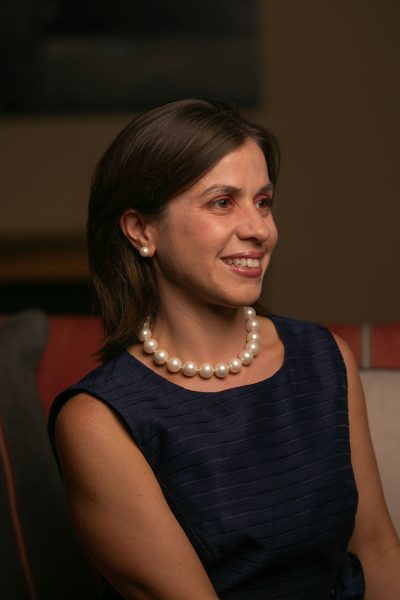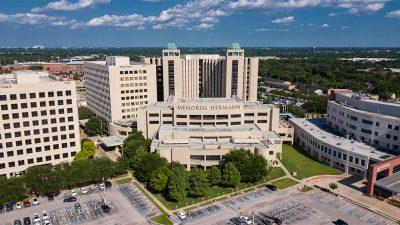 Giant nature photographs. Sleek, upholstered chairs. A middle-aged couple leaning over a clipboard signing forms.
Giant nature photographs. Sleek, upholstered chairs. A middle-aged couple leaning over a clipboard signing forms.
In the thoroughly conventional waiting room of a clinic at Memorial Hermann Southwest Hospital, there’s nothing to immediately suggest that this medical practice is revolutionary. But it is.
Run by the University of Houston School of Medicine, the direct primary care clinic in the Southwest Management District makes getting the checkups and doctor visits (which address up to 95 percent of patient medical needs) simple, affordable and promptly available for patients without health insurance.
Cutting private insurance companies and other third-party players from the process, the clinic instead charges clients a $60 monthly fee in return for unlimited primary care. Appointments are guaranteed within 48 hours. The fee can be paid when the patient calls to set up a visit, and it covers tele-health, basic procedures and lower prices for medications. Clients can pay for one month or ongoing coverage. And all Houstonians are welcome regardless of citizenship status.
The collaboration behind this new project is almost as unusual as the fee structure. Bankrolled by a $1 million startup gift from the Cullen Trust for Health Care, the clinic is staffed by UH faculty physicians and medical school students. This is because the clinic serves a double purpose: While giving hundreds of underserved Houstonians access to basic health care, it is also training a new generation of physicians to provide customized, comprehensive care that will reduce the number of uninsured patients needing hospitalization.
The medical school was founded in 2019 to address the shortage of primary care physicians in Texas and to carry out a social mission to improve health in underserved communities across the state, starting in Houston.
“The UH College of Medicine wants to restore primary care as the foundation of health care,” Dr. Stephen Spann, UHCOM’s founding dean, said when the clinic was launched in November 2021. “We are building our model upon the four pillars of access, population health, social determinants of health, and trusting relationships.”

Dr. Maria Colon-Gonzalez
Basing health care on these principles is more than just a philosophical approach. It’s a response to a public health crisis. Greater Houston has the highest rate of uninsured residents in the country: About a quarter of the area’s population lacks health insurance, whether for everyday illnesses like flus and fractures or for life-altering chronic diseases like diabetes and high blood pressure. In southwest Houston, where one in three people lives below the federal poverty level, the uninsured rate is 45 percent — five times the national average.
This healthcare vacuum costs the whole community. Between 80 and 95 percent of patient problems can be managed in a primary care practice. When a patient can’t get that care, smaller problems can become emergency room cases — and chronic problems can devolve into cascading medical crises with long hospital stays and enormous price tags for individuals and local government.
It takes careful strategy and investment to change the flawed system. One critical tactic: simplifying health care access for the many Houstonians who don’t have health insurance. That share of the population includes thousands of Houston residents who may own businesses and are eager to be insured, but are disqualified from Medicaid, Medicare or the healthcare marketplace because of their immigration status.
Other candidates for the clinic may be U.S. citizens who are eligible for those programs, but can only afford high-deductible plans, or are stuck with patchy, ineffective care when providers drop out of the networks.
Sixty-year old Roberto Johnson fell into the last category. A self-employed technical consultant for the live-streaming of church services, Johnson had been meticulous about managing his Type 1 diabetes. He’d been insured for most of the three decades since he moved to Houston from Chicago.
“I’ve had Obamacare, Trumpcare and Bidencare,” he said. But time after time in recent years, his healthcare providers have dropped out of the government networks, leaving Johnson without care as he searched for a new doctor. During these treatment gaps, Johnson had to go without professional monitoring as he searched for a replacement doctor.
“A couple of times I couldn’t get my insulin. Without it, your body starts to deteriorate,” he said.
But even with a consistent caregiver, Johnson has long been proactive about his diabetes. So when he heard about the opening of the primary care clinic on a local TV talk show, he called right away. The clinic gave him an appointment at once.
For $60, Johnson got a thorough initial appointment; repeat visits the same month to check his condition and, just as important in his view, extended conversations with his doctor to create an overall disease management plan.
“The doctor took some time,” Johnson noted. “I thought that was kind of unusual. They want to see, one on one, how you manage your own care. The doctor then told me a few things to do: recommended some vitamins and new techniques.”
 Johnson, in turn, proposed a change based on his own research: a new drug, available at Wal-Mart, that could reduce his $1,000 monthly insulin bill.
Johnson, in turn, proposed a change based on his own research: a new drug, available at Wal-Mart, that could reduce his $1,000 monthly insulin bill.
At other practices, Johnson said, doctors often seemed to suggest new medications based on not much more than a visit from a pharmaceutical representative. At the UH clinic, he said, his doctor listened attentively to Johnson’s economic argument for the new medicine and agreed it was worth a try.
“I ran with it,” Johnson said of the regimen he devised in partnership with his doctor. The result was startling. In 30 to 40 days, his blood sugar levels plunged. His medication bill dropped by almost two-thirds. Ever since, Johnson said, “I’ve been spreading the word.”
Outcomes like this are the reason UHCOM prioritizes teaching students how to deliver customized primary care for their underserved patients.
“Studies have shown that extended visits lead to a higher quality of care,” said Dr. Maria Colon-Gonzalez, the clinic’s anchor physician. “When students come here, they not only learn medicine — they learn internal medical skills” such as careful listening and comprehensive examinations.
Especially when facing chronic illnesses such as diabetes, she said, patients need an ongoing relationship with a physician who knows them – an ongoing partnership like the one that so benefited Roberto Johnson.
“There is a very fine line between lifestyle choices and imposed lifestyle,” Colon-Gonzalez said. She learned this first-hand growing up diabetic in Puerto Rico, where family meals were centered on beans and white rice. Managing the right diet for her illness in that environment was a gradual process.
By the same token, she said, “I cannot recommend, ‘You need to go to the gym’ if that’s not feasible, or ‘you need to go running every morning’ if someone lives in an unsafe neighborhood.”
Instead, Colon-Gonzalez asks, “How can we provide coaching in the context of the patient’s life? I guide the patient to make the changes they’re ready to make.”
With the new UHCOM primary care clinic, more Houstonians can now get that kind of attention – and a new generation of doctors will learn how to deliver it.
Call 713-743-0791 or click here to make an appointment.








